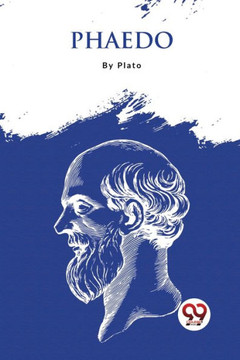
Binker North
Phaedo - 9781774419885
Product Code:
9781774419885
ISBN13:
9781774419885
Condition:
New
$14.10
Phaedo, also known to ancient readers as On The Soul, is one of the best-known dialogues of Plato's middle period, along with the Republic and the Symposium. The philosophical subject of the dialogue is the immortality of the soul. It is set in the last hours prior to the death of Socrates, and is Plato's fourth and last dialogue to detail the philosopher's final days, following Euthyphro, Apology, and Crito. One of the main themes in the Phaedo is the idea that the soul is immortal. In the dialogue, Socrates discusses the nature of the afterlife on his last day before being executed by drinking hemlock. Socrates has been imprisoned and sentenced to death by an Athenian jury for not believing in the gods of the state (though some scholars think it was more for his support of "philosopher kings" as opposed to democracy)[2] and for corrupting the youth of the city. By engaging in dialectic with a group of Socrates's friends, including the two Thebans, Cebes, and Simmias, Socrates explores various arguments for the soul's immortality in order to show that there is an afterlife in which the soul will dwell following death and, for couples and good people, be more at one with "every loving thing" and be more powerful than the Greek gods. Phaedo tells the story that following the discussion, he and the others were there to witness the death of Socrates. The Phaedo was first translated into Latin from Greek by Apuleius but no copy survived, so Henry Aristippus produced a new translation in 1160.
| Author: Plato |
| Publisher: Binker North |
| Publication Date: Jul 15, 2023 |
| Number of Pages: 110 pages |
| Language: English |
| Binding: Paperback |
| ISBN-10: 1774419882 |
| ISBN-13: 9781774419885 |

Phaedo - 9781774419885
$14.10
Phaedo, also known to ancient readers as On The Soul, is one of the best-known dialogues of Plato's middle period, along with the Republic and the Symposium. The philosophical subject of the dialogue is the immortality of the soul. It is set in the last hours prior to the death of Socrates, and is Plato's fourth and last dialogue to detail the philosopher's final days, following Euthyphro, Apology, and Crito. One of the main themes in the Phaedo is the idea that the soul is immortal. In the dialogue, Socrates discusses the nature of the afterlife on his last day before being executed by drinking hemlock. Socrates has been imprisoned and sentenced to death by an Athenian jury for not believing in the gods of the state (though some scholars think it was more for his support of "philosopher kings" as opposed to democracy)[2] and for corrupting the youth of the city. By engaging in dialectic with a group of Socrates's friends, including the two Thebans, Cebes, and Simmias, Socrates explores various arguments for the soul's immortality in order to show that there is an afterlife in which the soul will dwell following death and, for couples and good people, be more at one with "every loving thing" and be more powerful than the Greek gods. Phaedo tells the story that following the discussion, he and the others were there to witness the death of Socrates. The Phaedo was first translated into Latin from Greek by Apuleius but no copy survived, so Henry Aristippus produced a new translation in 1160.
| Author: Plato |
| Publisher: Binker North |
| Publication Date: Jul 15, 2023 |
| Number of Pages: 110 pages |
| Language: English |
| Binding: Paperback |
| ISBN-10: 1774419882 |
| ISBN-13: 9781774419885 |





